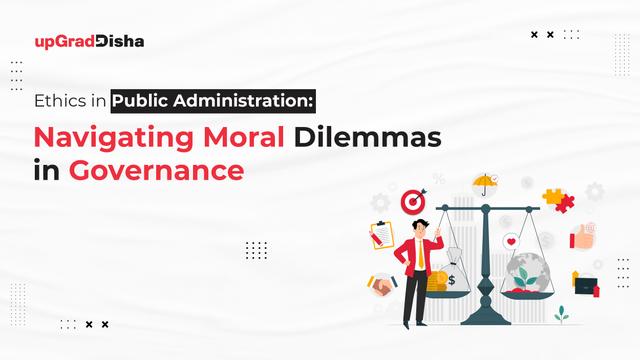Ethics in Public Administration: Navigating Moral Dilemmas in Governance
February 23rd, 2024: 5 mins
|
This Article Explores:
|
Public administration involves the implementation and management of government policies and programs. It ensures the ethical organization, operation, and control of various bureaucratic structures and makes the services available to the public.
However, while dealing with public matters, a public administrator will often find themselves stuck between the devil and the deep blue sea. Moral challenges in public administration, like corruption, favoritism, nepotism, etc., can lead to adversities like ineffective decision-making, tampering with public trust, and tarnishing the overall integrity of public institutions.
The concept of “ethics” can be a little tricky to define. This is where adequate knowledge of governance ethics in Public Administration comes in handy. Stick through till the end of this blog to know more.
Importance of Ethics in Public Administration
Ethics is important in public administration as it helps ensure that all the finances, resources, and other benefits that people are entitled to are being managed honestly and efficiently. Listed below are some reasons why ethics is an important component of public administration:
- It promotes a sense of accountability and increases transparency.
- It helps to check the actions of the Civil Servants.
- It helps promote a sense of social well-being among individuals and protects the interest of the public for the common good.
- It can help to improve the effectiveness and efficiency of administrative procedures.
In a nutshell, abiding by the public administration code of ethics helps to control corruption and safeguards public interest.
However, public administration ethics depend on a number of factors. Let’s shed some light on it.
Factors that Determine Ethical Decision-Making in Public Service

To adhere to the values of governance as enshrined in our constitution, it is important to abide by an ethical framework, thereby making “ethics’ an important part of public administration.
There are a number of factors that impact ethical decision-making in public service:
Historical factors
If the legacy of unethical practices in the field of governance has been prolonged, it is likely that there will be an increased tolerance towards immorality in administration. There may be some unethical trends set up by top administrators that might be accepted as normal.
Socio-cultural factors
The conduct of administrative professionals is likely to radiate the morality that is prevalent in their society. Long-running cultural practices, set values, and societal expectations tend to play a critical role in establishing ethical considerations within the public sector.
Judicial factors
For the smooth execution of public affairs, a fair and just judicial system has an important role to play. A slow-moving judiciary in the form of prolonged trials will act as an added advantage for perpetrators of crime.
Economic factors
The amount of economic development in a country is also one of the key factors that help determine the level of morality or immorality being practiced in the region in terms of public administration. The lower the level of economic development, the less people are likely to forsake the principles related to honest conduct.
To deal with all these situations tactfully, one can pursue ethics training for public administrators. Here, you will learn about the different aspects that are responsible for ethical decision-making in the field of public administration and service.
Different Aspects of Ethics in Public Administration
Ethical conduct in public administration is a multi-dimensional concept. Listed below are the different aspects that help to determine ethics in public administration:
- Integrity: Public administration integrity issues may arise when an administrator starts taking undue advantage of their position and serves their personal interest or illegitimate interests of groups. A public servant must uphold their integrity for the interests of the people they serve.
Besides being neutral and impartial, they should refrain from actions that may demonstrate any kind of bias.
- Excellence: A public administrator should not compromise their standards. They should uphold their excellence and maintain the highest standard of quality while making administrative decisions,
- Dedication: One who is working for the welfare of people should be committed to their duties and exhibit sheer dedication, intelligence, and involvement. They should not hesitate to accept responsibilities and fulfill their duties with due diligence.
- Transparency: A public servant also has to maintain transparency while making decisions. There should be enough reason in support of any decision they make for the sake of the people.
However, an administrator should also use their own discretion to ensure that they exhibit enough compassion towards the vulnerable sections of society without violating the prescribed laws and rules. Responsiveness and promptness while dealing with public affairs are other responsibilities of an ethical public administrator that they must adhere to with consistency.
Formal training in public administration is sure to equip an aspiring public servant with the knowledge and skills required to tactfully dodge any potential moral challenges in public service. Upskilling with online BA programs specializing in public administration can be an excellent pick if you’re hoping to serve the public ethically through this role!
Conclusion
Public administrators are accountable to the public for all their official movements, schedules, meetings, and whereabouts. There is a robust ethical infrastructure based on principles of surveillance and communication that helps prevent any kind of unethical conduct.
Adequate training on ethical matters of public administration not only equips administrators with the knowledge on how to deal with public matters but also streamlines the work and enhances efficiency, leading to a just and fairly functioning society.
